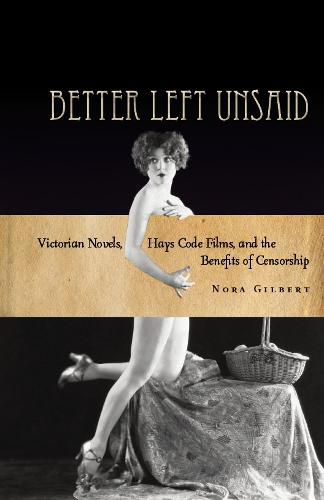Readings Newsletter
Become a Readings Member to make your shopping experience even easier.
Sign in or sign up for free!
You’re not far away from qualifying for FREE standard shipping within Australia
You’ve qualified for FREE standard shipping within Australia
The cart is loading…






Better Left Unsaid is in the unseemly position of defending censorship from the central allegations that are traditionally leveled against it. Taking two genres generally presumed to have been stymied by the censor’s knife-the Victorian novel and classical Hollywood film-this book reveals the varied ways in which censorship, for all its blustery self-righteousness, can actually be good for sex, politics, feminism, and art.
As much as Victorianism is equated with such cultural impulses as repression and prudery, few scholars have explored the Victorian novel as a censored commodity-thanks, in large part, to the indirectness and intangibility of England’s literary censorship process. This indirection stands in sharp contrast to the explicit, detailed formality of Hollywood’s infamous Production Code of 1930. In comparing these two versions of censorship, Nora Gilbert explores the paradoxical effects of prohibitive practices. Rather than being ruined by censorship, Victorian novels and Hays Code films were stirred and stimulated by the very forces meant to restrain them.
$9.00 standard shipping within Australia
FREE standard shipping within Australia for orders over $100.00
Express & International shipping calculated at checkout
Better Left Unsaid is in the unseemly position of defending censorship from the central allegations that are traditionally leveled against it. Taking two genres generally presumed to have been stymied by the censor’s knife-the Victorian novel and classical Hollywood film-this book reveals the varied ways in which censorship, for all its blustery self-righteousness, can actually be good for sex, politics, feminism, and art.
As much as Victorianism is equated with such cultural impulses as repression and prudery, few scholars have explored the Victorian novel as a censored commodity-thanks, in large part, to the indirectness and intangibility of England’s literary censorship process. This indirection stands in sharp contrast to the explicit, detailed formality of Hollywood’s infamous Production Code of 1930. In comparing these two versions of censorship, Nora Gilbert explores the paradoxical effects of prohibitive practices. Rather than being ruined by censorship, Victorian novels and Hays Code films were stirred and stimulated by the very forces meant to restrain them.